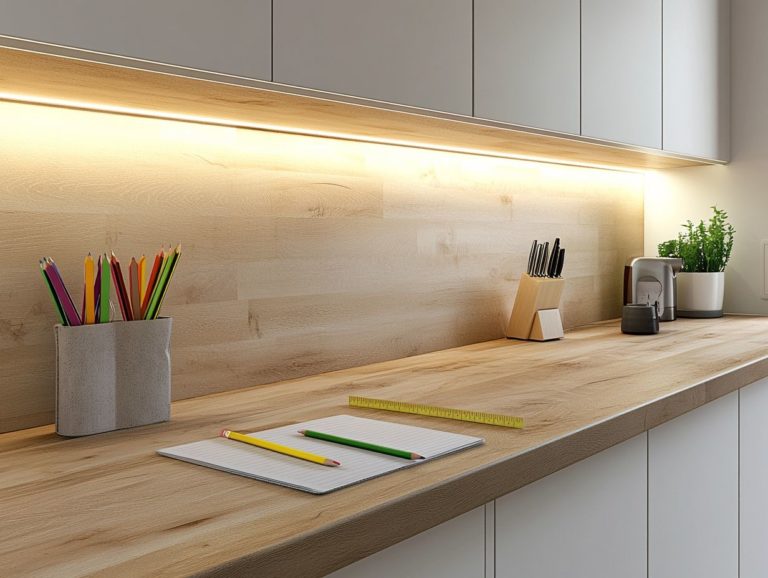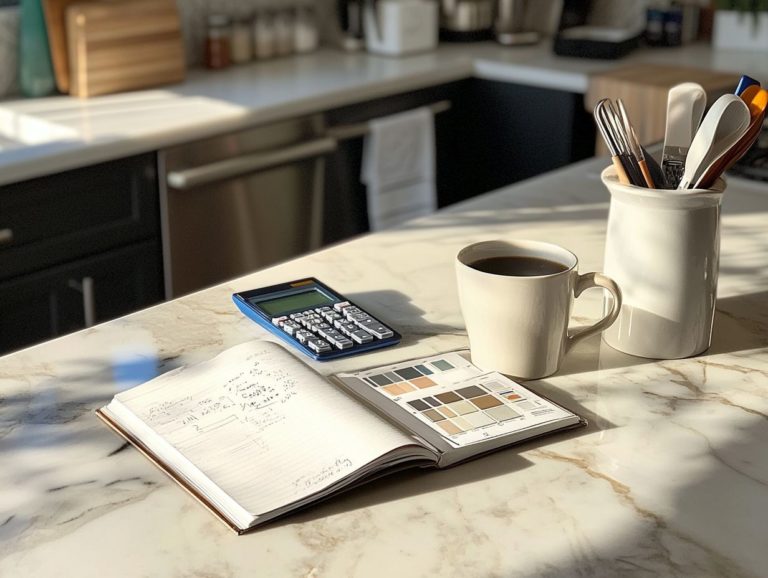5 Common Budgeting Mistakes in Kitchen Remodeling
Embarking on a kitchen remodel is an exhilarating yet challenging journey, particularly when managing your budget.
Many homeowners fall into common traps that can lead to financial headaches later on. From underestimating material costs to overlooking hidden expenses, these pitfalls can easily derail even the most carefully crafted plans.
This article will shed light on five critical budgeting mistakes to avoid, providing you with practical tips to keep your remodel on track and within budget.
We’ll also discuss how to select the right contractor and the importance of having a backup plan.
Are you excited to create your dream kitchen on a budget? Let’s dive in!
Contents
- Key Takeaways:
- 1. Underestimating the Cost of Materials
- 2. Not Setting a Realistic Budget
- 3. Not Factoring in Hidden Costs
- 4. Choosing the Wrong Contractor
- 5. Not Having a Contingency Plan
- How Can You Avoid These Budgeting Mistakes?
- What Are the Most Common Hidden Costs in Kitchen Remodeling?
- Frequently Asked Questions
- 1. What are the most common budgeting mistakes people make when remodeling their kitchen?
- 2. How can underestimating costs affect my kitchen remodeling budget?
- 3. Why is it important to account for unexpected expenses in a kitchen remodeling budget?
- 4. What are some ways to avoid splurging on unnecessary items during a kitchen remodel?
- 5. How can setting aside a contingency budget benefit my kitchen remodeling project?
- 6. What kind of research should I do to avoid budgeting mistakes in a kitchen remodel?
Key Takeaways:

- Underestimate the cost of materials at your own risk! Research and account for all materials needed in a kitchen remodel.
- A realistic budget is key. Consider all factors and set aside extra money for unexpected expenses.
- Hidden costs can quickly add up in a kitchen remodel. Be sure to account for permits, labor costs, and potential damages.
1. Underestimating the Cost of Materials
Underestimating material costs is a common pitfall in kitchen remodel projects. This mistake can lead to substantial budget overruns and unexpected financial strain, affecting the success of your entire renovation.
A lack of careful planning and precise estimates often results in frustrating delays and compromises on quality. With materials like cabinets, countertops, and flooring, prices and quality can vary dramatically, making your choices all the more critical.
Experts like Michael Menn emphasize recognizing the distinct value each material offers and the need for clear budget allocation.
To avoid missteps like underestimating costs or overlooking essential details, conduct thorough research and consult with experienced professionals during the planning phase. This proactive approach will help ensure your kitchen remodel meets your expectations and stays within budget.
2. Not Setting a Realistic Budget
Not setting a realistic budget is one of the most critical mistakes in the kitchen remodeling process. This oversight often leads to financial strain and incomplete renovations, impacting your kitchen’s design and functionality.
Understanding the nuances of affordable yet high-quality upgrades is essential. Financial experts, including Paul Henthorn, emphasize detailed planning. Start by assessing your priorities and researching potential costs associated with materials, labor, and those sneaky unforeseen expenses.
A common blunder is underestimating hidden costs, which can derail even the most well-thought-out plans. By outlining a precise financial trajectory and regularly consulting project estimates, you can avoid pitfalls, maintain control over your expenses, and ultimately create a kitchen that beautifully balances aesthetics with your budget constraints.
3. Not Factoring in Hidden Costs
One of the most frequently overlooked aspects of a kitchen remodel is accounting for hidden costs. These expenses can significantly inflate your final budget and disrupt the renovation timeline if not planned for from the beginning.
These sneaky expenses might include necessary upgrades to electrical outlets to meet safety codes or plumbing adjustments you hadn’t initially considered. Unexpected structural issues, such as outdated wiring or damage lurking behind the walls, can complicate the project.
Experts like Nastaran Mousavi emphasize that thorough renovation planning is crucial for navigating these hidden costs. By consulting professionals and conducting a detailed assessment of your existing space, you can minimize surprises and create a more accurate budget.
This proactive approach ensures a smooth and successful remodeling experience.
Ready to start planning your kitchen remodel today to avoid these pitfalls? Take action now!
4. Choosing the Wrong Contractor

Choosing the wrong contractor for your kitchen remodel can lead to many problems. These range from poor craftsmanship to delays, ultimately causing dissatisfaction with the renovation.
To steer clear of these pitfalls, it’s crucial to thoroughly vet potential builders before making a commitment. Industry experts like Lanna Ali-Hassan highlight the necessity of checking references and reviewing past work to ensure that quality standards are upheld.
Many common remodeling mistakes arise from poor planning and miscommunication. You can mitigate these issues by selecting a contractor who values transparency and has a solid track record.
Pay attention to contracts and timelines to protect your investment and ensure a seamless remodeling experience.
5. Not Having a Contingency Plan
Not having a contingency plan for your kitchen remodel can leave you exposed to unexpected challenges and expenses, putting your budget and the success of your project at risk.
Without proper safeguards, you might face delays caused by unexpected issues like structural problems, permitting challenges, or supply chain disruptions.
John Starck, a renovation expert, emphasizes the importance of having a solid backup plan. This plan prepares you for surprises and helps your kitchen workflow run smoothly.
Anticipating potential hiccups allows you to allocate resources effectively, making the remodeling process far less intimidating. This transforms DIY projects into manageable and enjoyable endeavors.
Taking this proactive step can make your renovation a breeze, ensuring that the final result aligns with your vision while keeping your budget intact.
How Can You Avoid These Budgeting Mistakes?
Avoiding budgeting mistakes during your kitchen remodel requires meticulous planning, thorough research, and a clear grasp of renovation costs. This approach ensures your home improvement project stays on track while meeting both your aesthetic and functional goals.
To achieve this, consider consulting industry experts like Michael Menn, who stress the importance of setting a realistic budget before plunging into the design phase. It’s crucial to identify which trendy elements can be integrated without compromising quality or straining your finances.
By prioritizing key components, such as cabinetry and countertops, you create room for flexibility in other areas, resulting in a cohesive look that exudes style.
Maintaining open lines of communication with your contractors and suppliers will help you sidestep common pitfalls, ensuring your project aligns with your vision and financial framework.
What Are the Most Common Hidden Costs in Kitchen Remodeling?
The most common hidden costs include:
- Appliance measurements
- Unexpected structural changes
- Additional labor fees
If you don’t factor these into your renovation planning from the outset, they can quickly add up to significant expenses.
These costs frequently catch homeowners off guard, leading to financial strain. Industry expert Mike Jackson points out that overlooked factors, such as plumbing modifications and electrical upgrades, can also inflate your budget unexpectedly.
Understanding the kitchen triangle—where the sink, stove, and fridge are placed—helps you design an efficient space. This ensures your appliances fit perfectly. By incorporating these considerations early in the process, you can develop a more accurate budget that minimizes the risk of unforeseen costs derailing your renovation dreams.
How Can You Determine a Realistic Budget for Your Kitchen Remodel?

Determining a realistic budget for your kitchen remodel requires a thorough analysis of the costs of the remodel, consultation with professional builders, and a keen understanding of the essential elements that enhance both functionality and aesthetics in your kitchen.
To ensure your budget aligns with the project’s specific needs, start by listing all potential expenses—from cabinetry and countertops to fixtures and appliances.
Utilizing tools available on platforms like HGTV can offer valuable insights into average costs. You’ll also find innovative design ideas.
Don’t forget to consider storage solutions; they keep your kitchen organized and functional!
Incorporating smart cabinetry and shelving options boosts usability and should be factored into your overall budget. By carefully evaluating these components, you can craft a comprehensive financial plan that addresses both practical needs and your stylistic aspirations.
What Are the Essential Factors to Consider When Choosing a Contractor?
When selecting a contractor for your kitchen remodel, consider their experience, the quality of materials they use, and their communication skills. These factors significantly affect the success of your renovation project and help minimize potential errors.
Review a contractor’s portfolio and client testimonials to gain insights into their capabilities. This can offer a glimpse into their design skills and ability to stick to timelines.
A qualified contractor should possess technical skills and a deep understanding of how layout and lighting work together to create a cohesive kitchen design. This expertise paves the way for innovative solutions that enhance both functionality and aesthetics.
What Are the Benefits of Having a Contingency Plan in Place?
Having a contingency plan during your kitchen remodel brings numerous advantages, such as improved kitchen efficiency, enhanced budget management, and the ability to navigate unforeseen challenges without derailing your timeline.
By anticipating potential issues and establishing backup strategies, you can maintain a clear vision and minimize disruptions. According to Architectural Digest, strategic planning not only optimizes your space but also ensures every square foot serves a meaningful purpose.
This foresight can lead to innovative solutions, like rearranging layouts or selecting multifunctional fixtures, ultimately boosting your kitchen’s usability.
A solid contingency plan acts as your safety net against unexpected expenses, ensuring that your renovation stays within budget while still achieving your desired design outcomes.
How Can You Stick to Your Budget During the Remodeling Process?
Sticking to your budget during the remodeling process demands disciplined budget management strategies, meticulous planning, and flexibility to adapt to changes, all while keeping your kitchen remodel goals firmly in sight.
Prioritize your expenses to ensure your flooring choices harmonize with both your aesthetic aspirations and practical needs. For example, opting for durable materials that mimic the appearance of pricier options can lead to substantial savings.
Explore current trends that blend style with affordability, giving you the power to make informed decisions without compromising your budget. Act quickly to research promotions and compare prices from various suppliers to uncover hidden gems and maximize your investment.
Frequently Asked Questions

1. What are the most common budgeting mistakes people make when remodeling their kitchen?
Some of the most common budgeting mistakes in kitchen remodeling include underestimating costs, not accounting for unexpected expenses, splurging on unnecessary items, not setting aside a contingency budget, and not doing enough research on materials and labor costs.
2. How can underestimating costs affect my kitchen remodeling budget?
Underestimating costs can lead to going over your budget. You might end up cutting corners or sacrificing important elements of your kitchen remodel.
This can cause delays and leave projects unfinished if funds run out.
3. Why is it important to account for unexpected expenses in a kitchen remodeling budget?
Kitchen remodeling often faces unexpected problems, like hidden water damage or structural issues. Having a budget for these surprises helps you stay on track financially.
4. What are some ways to avoid splurging on unnecessary items during a kitchen remodel?
Create a detailed budget and stick to it. Focus on the essential elements of your remodel and allocate funds wisely.
Research cost-effective alternatives for materials and appliances to save money.
5. How can setting aside a contingency budget benefit my kitchen remodeling project?
A contingency budget protects you from unexpected costs and keeps your project on track. It’s reassuring to know you have extra funds for any issues that may arise during renovations.
6. What kind of research should I do to avoid budgeting mistakes in a kitchen remodel?
Before starting, research average material and labor costs in your area. Get multiple quotes from contractors and compare prices.
Look into various design options and cost-saving tips to create a more accurate budget.





